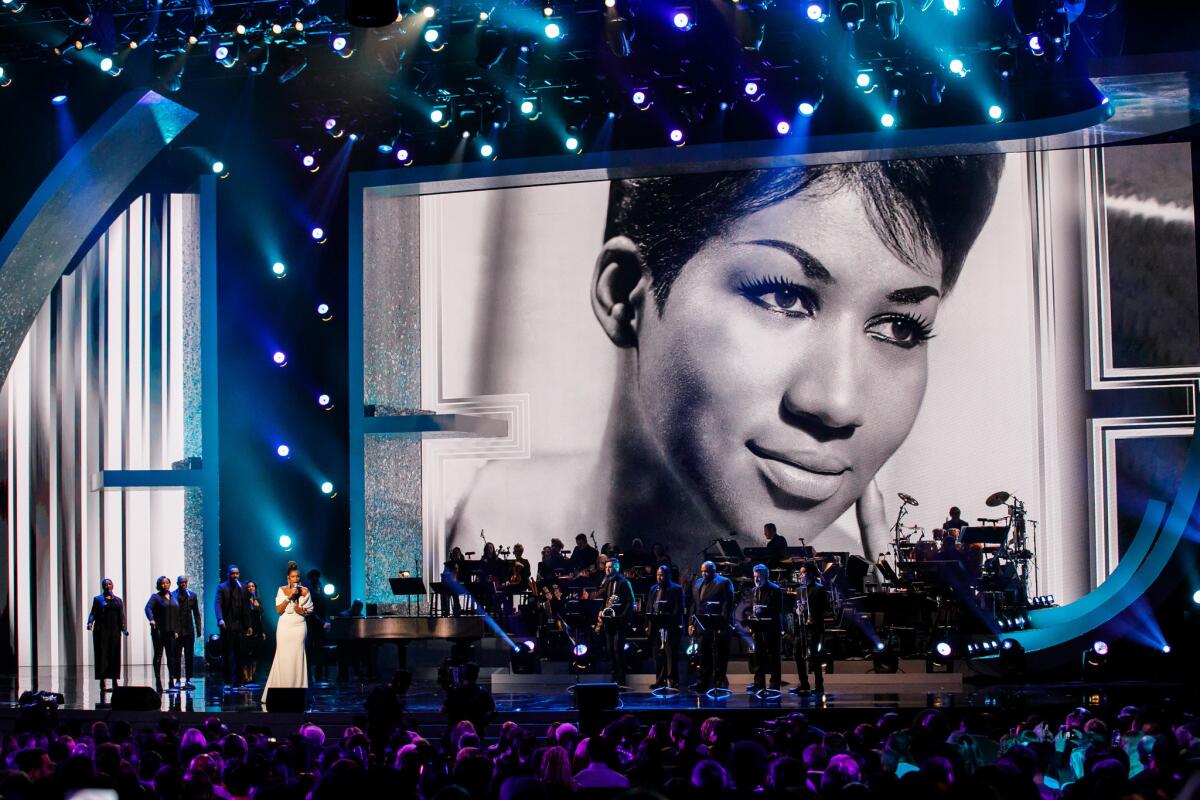Review: Was Aretha Franklin properly honored at her all-star Grammy tribute?

To honor Aretha Franklin’s roots in gospel music, Shirley Caesar sang “Mary, Don’t You Weep.” To showcase Franklin’s rhythmic flair, Janelle Monáe did “Rock Steady.”
And to highlight the late icon’s important role in the fight for civil rights? We heard “A Change Is Gonna Come” as performed by … Celine Dion.
Yes, you knew you were at a Recording Academy event when the French-Canadian pop star took the stage at the Shrine Auditorium to sing Sam Cooke’s searing anthem about American racism.
Held Sunday night, five months after Franklin’s death at age 76, “Aretha! A Grammy Celebration for the Queen of Soul” convened an all-star group of admirers — John Legend, Patti LaBelle, Jennifer Hudson, Alicia Keys, Brandi Carlile and Yolanda Adams were also there — for an affectionate tribute concert taped for broadcast on CBS in March.
And like earlier academy salutes (to the likes of Stevie Wonder and the Bee Gees), this one mixed sensible renditions of the honoree’s work with moments that made you wonder which competing interests were at the wheel.
That’s not to say that Dion flubbed “A Change Is Gonna Come,” famously recorded by Franklin — the show-closing song served as a knowing bookend to the opening “Respect” — on her breakthrough album, 1967’s “I Never Loved a Man the Way I Love You.”
Digging into the lowest, growliest parts of her register, Dion found a bruised and soulful quality that she rarely puts across; her “Change” wasn’t quite sure how to get where it wanted to go, which suited a tune about not knowing “what’s up there beyond the sky.”
Yet the curious pairing of singer and song — accompanied on a video screen, no less, by images of segregation-era “whites only” signs — demonstrated a lack of intellectual rigor familiar to anyone who takes in the often perplexing tribute performances that pepper the Grammy Awards every year.
Did “Aretha!” make clear that artists love and respect Franklin and her music? Of course. But the show stopped short of explaining or unpacking that connection; it didn’t add to (or contradict) what we already know about her and her inheritors, and that felt unworthy of a creative genius whose music was always raising questions about race and gender and age.
I’m not saying I needed a non-white singer to do “A Change Is Gonna Come” — although that might not have been the worst idea for a song that explicitly looks toward a future in which marginalized people tell their own stories.
From Dion, though, I needed more of a sense of how she feels “Change” pertains to our uneasy era — if the deliverance it promises has been achieved. I needed more from Andra Day, a young throwback-R&B type with little apparent interest in modern music, to understand what she hears in Franklin’s happily synthetic “Freeway of Love.”
And I needed more from Chloe x Halle to believe that this sister duo wasn’t performing “Sisters Are Doin’ It for Themselves” because somebody at the academy thought it would be cute.
Aretha Franklin dies at 76: Remembering the Queen of Soul »
Lovers of these kinds of events — and I’ll admit I’ve endured so many that my demands are as high as my expectations are low — might argue that a great performance is the explanation of what one act holds dear about another.
And indeed Sunday’s concert contained a few of those, including Monáe’s rollicking, almost punky “Rock Steady” and a precise yet relaxed take on “Bridge Over Troubled Water” that communicated Legend’s awe for the way Franklin could make herself at home inside another writer’s song. (He was offering a “cover of her cover” of Paul Simon’s original, he said.)
That gospel sequence with Caesar, which also featured Adams and BeBe Winans, was strong too; it illuminated the tradition that Franklin was born into along with her desire to break out of it, thanks to an appealing bit of grandstanding from the 80-year-old Caesar, who continued to sing even as she was being shuffled offstage.
But Hudson doing “Respect,” Keys doing “Spirit in the Dark,” Alessia Cara doing “Until You Come Back to Me” — these tidy, too-faithful performances just made you think about how much tinkering Franklin’s sturdy songs could withstand if only folks would exercise a bit of her imagination.
What better way to honor her example than to rework her material as dramatically as she reworked others’?
The evening closed, inevitably, with an updated spin on an awards-show set piece that Franklin took part in numerous times during her life: a group rendition of “(You Make Me Feel Like) A Natural Woman,” in this case with Day, Cara, Carlile and Fantasia, the last of whom had been teamed earlier with Rob Thomas for a profoundly chemistry-free “I Knew You Were Waiting.”
Fantasia fared better here but not because this foursome felt any more intelligently designed. Instead, she seemed to grasp intuitively that someone in the bunch had to seize Franklin’s role as the diva in charge — and so seize it she did, veering from the song’s melody in intense vocal runs that carried decades of deep thinking about men and women, black and white, Saturday night and Sunday morning.
For a minute, at least, you could feel Aretha in the room.
Twitter: @mikaelwood
More to Read
The biggest entertainment stories
Get our big stories about Hollywood, film, television, music, arts, culture and more right in your inbox as soon as they publish.
You may occasionally receive promotional content from the Los Angeles Times.











